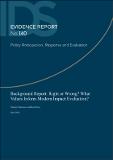| dc.contributor.author | Munslow, T | |
| dc.contributor.author | Hale, K | |
| dc.date.accessioned | 2015-06-18T11:56:22Z | |
| dc.date.available | 2015-06-18T11:56:22Z | |
| dc.date.issued | 2015-06 | |
| dc.identifier.citation | Munslow, T. and Hale, K. (2015) Background Report: Right or Wrong? What Values Inform Modern Impact Evaluation?, IDS Evidence Report 140, Brighton: IDS | en |
| dc.identifier.uri | https://opendocs.ids.ac.uk/opendocs/handle/20.500.12413/6410 | |
| dc.description.abstract | This background report supported an event hosted in January 2015 by the Centre for Development Impact (CDI) – a joint initiative between the Institute of Development Studies (IDS), Itad and the University of East Anglia (UEA) – with the objective of opening up the debate on ethics and exploring how it can become more relevant to the field of impact evaluation. In doing so, it provided the setting for discussion around key themes: outlining definitions of ethics; the landscape of official ethical guidance in evaluation; and shortcomings of ethical guidance. For more details of this event please refer to the event report (IDS Evidence Report 139).
In this Evidence Report, we discuss some of the limitations of current ethical debates in the field of impact evaluation, and evaluation more broadly, reflected in the interview data reported. Firstly, we argue that evaluation is different to research, being inherently about resource use decisions, and often politicised in some way because significant interests are at stake (a point we discuss at length in Section 6). An approach that is primarily about the ‘protection of the subject’ – as borrowed from research – underplays the potential role of ethics in the value judgements made by evaluators, as well as evaluation’s broader ethical role in society (such as accountability to citizens, or the moral obligation to make data available for re-analysis). And secondly, we argue that the reality of evaluation ethics is ultimately achieved through a series of value judgements that are ‘situated in practice’ and are not guided solely by ethical principles.
This report goes on to conclude that a new ethical agenda is needed to broaden the debate so that ethical practice within evaluation is not limited to complying with procedures borrowed from medical research where the moral imperative is the protection of the subject. | en |
| dc.description.sponsorship | UK Department for International Development | en |
| dc.language.iso | en | en |
| dc.publisher | IDS | en |
| dc.relation.ispartofseries | IDS Evidence Report;140 | |
| dc.rights.uri | http://creativecommons.org/licenses/by/3.0/ | en |
| dc.title | Background Report: Right or Wrong? What Values Inform Modern Impact Evaluation? | en |
| dc.type | IDS Evidence Report | en |
| dc.rights.holder | IDS | en |
| dc.identifier.ag | OT/11009/7/3/5/589 | |


